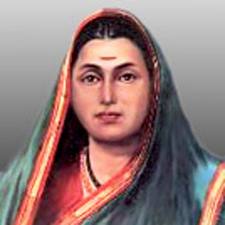
Savitribai Jotiba Phule (January 3, 1831 – March 10, 1897) was a social reformer, who, along with her husband, Mahatma Jotiba Phule, played an important role in improving women’s rights in India during the British Rule.
Savitribai was the first female teacher of the first women’s school in India and also considered as the pioneer of modern Marathi poetry. In 1852 she opened a school for Untouchable girls.
Women’s education
Under Jyotiba’s influence Savitribai had taken women’s education and their liberation from the cultural patterns of the male-dominated society as mission of her life. She worked towards tackling some of the then major social problems, including women’s liberation, widow remarriages and removal of untouchability.
However, apart from all oppositions, Savitribai yet continued to teach the girls. Whenever Savitribai went out of her house, groups of orthodox men would follow her and abuse her in obscene language. They would throw rotten eggs, cow dung, tomatoes and stones at her. She would walk meekly and arrive at her school. Fed up with the treatment meted out to her, she decided to give up. But it was because of her husband that she continued with her efforts. He told Savitribai that Jyotiba, who was working for women’s education, had started the first girls’ school and required women teachers to assist him.
Jyotiba educated and trained Savitribai, his first and ideal candidate for this job of a teacher. Savitribai and Jyotiba faced fierce resistance from the orthodox elements of society for this. Jyotiba sent her to a training school from where she passed with flying colours along with a Muslim lady Fatima Sheikh.[3] When Savitribai completed her studies, she, along with her husband, started a school for girls on 1st January 1848 in a place called Bhide Wada, Narayan Peth, Pune. Nine girls, belonging to different castes, enrolled themselves as students.
Slowly and steadily, she established herself. Jyotiba and Savitribai managed to open 5 more schools in the year 1848 itself. She was ultimately honoured by the British for her educational work. In 1852 Jyotiba and Savitribai were felicitated and presented with a shawl each by the government for their commendable efforts in Vishrambag Wada.
Widow Remarriage
The next step was equally revolutionary. Savitri realised that along with education it was necessary to work on other social fronts, to build up the self esteem and confidence of women. She also campaigned against some cruel social practices. Many girls who were married off young would be widowed by the age of twelve – thirteen. After the death of their husbands, either they would have to take Sati (a practice of burning the widow on the funeral pyre of the husband) or their head would be clean shaven to make them ugly and unattractive to other men. These helpless women, with no rights to denial, would be easy targets for depraved men. The resultant pregnant widows would be scared of being ostracized by the society and the suppression that the child would have to suffer, and would resort to suicide or killing the new born.To counteract this situation, JyotiRao started a home for the pregnant widows and orphaned children to stop this carnage. Savtri ran the home capably. She considered all the children in the orphanage like her own.
Savitribai and Jyotiba were moved by the plight of such widows and castigated the barbers. They organized a strike of barbers and persuaded them not to shave the heads of widows. This was the first strike of its kind.
Social reforms
Savitribai was not only involved in educational activities of Jyotirao but also in every social struggle that he launched. They also fought against all forms of social prejudices. They were moved to see the untouchables who were refused drinking water meant for the upper caste. Both Jyotiba and Savitribai opened up their reservoir of water to the untouchables in the precincts of their house.
Once Jyotiba stopped a pregnant lady from committing suicide, promising her to give her child his name after it was born. Savitribai readily accepted the lady in her house and willingly assured to help her deliver the child. Savitribai and Jyotiba later on adopted this child who then grew up to become a doctor. This incident opened new horizons for the couple. Many women were driven to commit suicide by men who had exploited them to satisfy their lust and then deserted them. Therefore, Savitribai and Jyotiba put boards on streets about the “Delivery Home” for women on whom pregnancy had been forced. The delivery home was called “Balhatya Pratibandhak Griha”.
Jyotiba and Savitribai were also opposed to idolatry and championed the cause of peasants and workers. They faced social isolation and vicious attacks from people whom they questioned. After his demise, Savitribai took over the responsibility of Satya Shodhak Samaj, founded by Jyotiba. She presided over meetings and guided workers.
In 1868 she welcomed untouchables to take water from her well. She also was the first woman to lit her husband’s pyre in the history of India.
